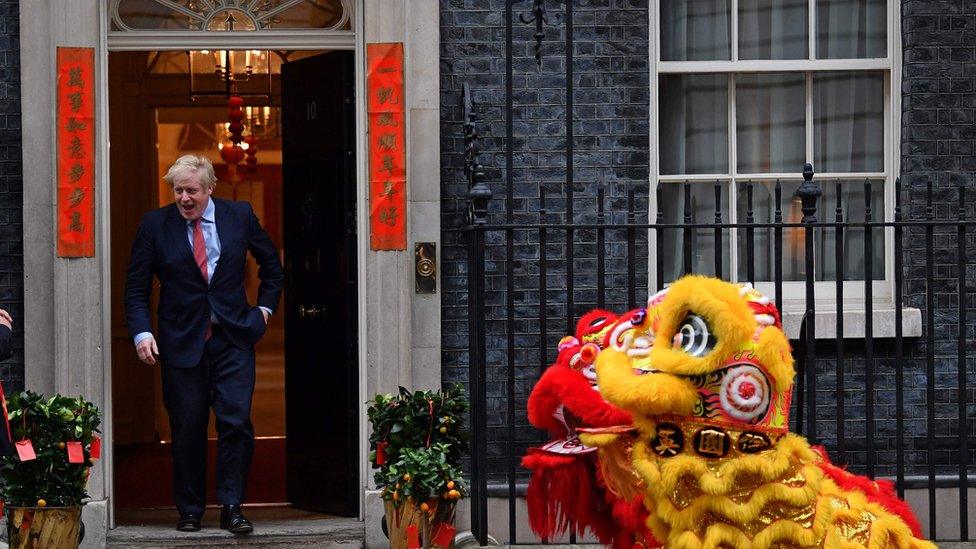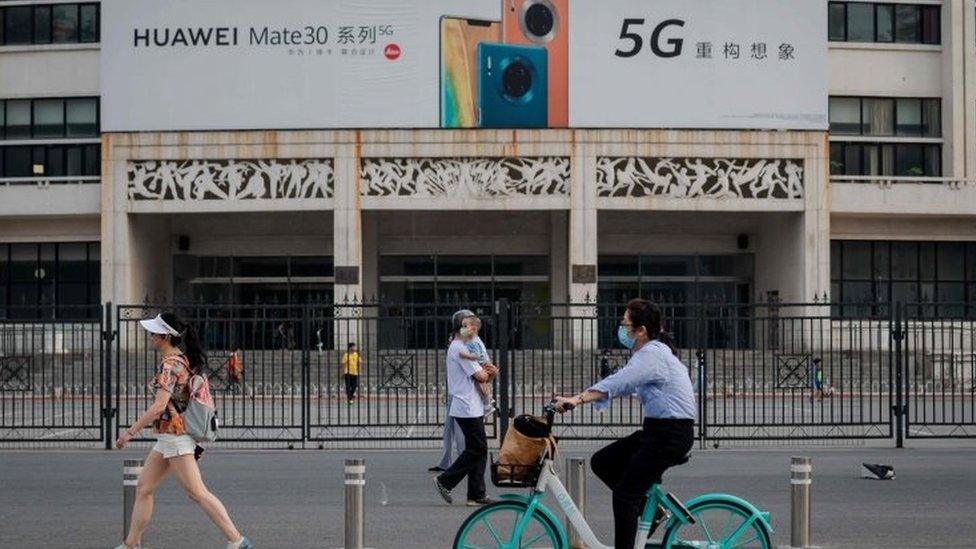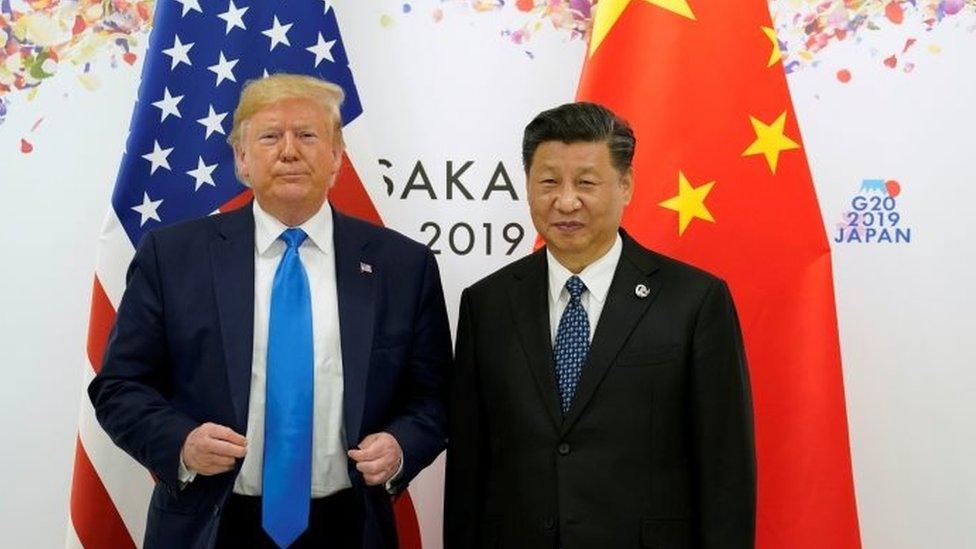Political battle looming over UK China relations
- Published

Boris Johnson celebrates Chinese New Year in January
Rare is the day when some vexed foreign question does not grip British politics.
In recent decades there have been the bitter battles over Europe. But now China is taking its place in the corridors of Westminster as the defining external issue de nos jours.
Across the green benches the mood against China appears to be hardening, in part because of the way Beijing handled the coronavirus pandemic, but also now as a result of its plans to impose tough new security laws in Hong Kong.
There are new groups being formed by Conservative MPs, such as the China Research Group, pushing for a more robust line. Networks of MPs are being set up on Whatsapp to coordinate strategies.
Dean Godson, director of the centre-right think tank, Policy Exchange argues that different wings of the Conservative Party are coming together, external to demand a tougher line on the People's Republic of China.
This coalition of what he calls "PRC-sceptic" MPs includes: pro-American MPs who fear a UK/US trade deal could be threatened unless Britain matches President Trump's hostility to China; human rights advocates concerned about its treatment of Uighur Muslims; liberal internationalists disturbed by China's challenge to the global rules based order; new MPs in the north of England anxious about factories damaged by China's anti-competitive practises.
'Golden era'
All this - plus the urgings of an increasingly China-hostile White House - is putting pressure on the UK government to harden its line.
Some MPs want Downing Street to ditch - or at least water down significantly - its plans to give the Chinese technology giant Huawei a partial role in the development of the UK's 5G network.
Other Tory MPs are looking for a tougher response on Hong Kong. And now, in the wake of what many MPs see as China's mishandling of the pandemic - its initial attempted cover-up, its subsequent aggressive "wolf warrior" diplomacy - there are also growing calls for a more fundamental rethink of Britain's strategy towards China.
But this growing China-scepticism is not shared by all and will be resisted.

Concerns about telecoms giant Huawei rumble on
The Conservatives are led by a prime minister, Boris Johnson, who has been instinctively supportive of engagement with China.
As London Mayor, he was a vocal advocate of David Cameron's efforts to create a "golden era" in UK/China relations.
'Scapegoat'
As Foreign Secretary, he never failed to remind Chinese visitors how his daughter was learning Mandarin.
In an interview broadcast by Phoenix Television in Hong Kong, external last summer, the future prime minister said. "We're interested in what President Xi is doing…we are very pro-China."
Some Conservative MPs are concerned about what they see as a new sinophobic tone from colleagues.
"They are being a little bit swivel-eyed and alarmist," said one. "I am not sure how much they really understand China."
These MPs fear the anti-China mood gripping both sides in the US presidential election is beginning to infect British politics too.
Richard Graham MP, chairman of the All Party Parliamentary China Group, said: "It might be tempting for everyone to want to treat China as a new national scapegoat, just as the EU was a convenient scapegoat in recent years.
"But it is not the most important thing in the minds of our constituents. The most important thing is going to be jobs. And in that sense, having a strong partnership with China makes absolute sense."
Climate change
So perhaps the biggest obstacle to the growing tide of China-scepticism will be the huge economic downturn expected to follow the pandemic.
Some MPs believe the UK will not be able to afford a political battle with Beijing just when it will need Chinese investment to kick start the economy.
Some sources say this concern is shared at the top of the Treasury and the Foreign Office. It is worth remembering that for many Brexiteers, part of the post-EU "global Britain" vision involved much greater trade with China.
Other Conservatives MPs argue it would be unwise for Britain to disengage with a country that is central to most global issues.
Take climate change.
'Constructive engagement'
China is both the largest emitter of carbon and the biggest investor in renewable energy. If Britain wants the COP26 summit in Glasgow next year to be a success in setting a new path for the world's climate, then China, they argue, will have to be part of the deal.
Sir Simon Macdonald, permanent secretary at the Foreign Office, told the Foreign Affairs committee last month, external: "No problem that the world faces today can be addressed - still less solved - without the active participation of China. China is critical across the full policy waterfront."

Are growing strains between the US and China affecting UK politics?
There will be countervailing pressures, too, from the Labour Party.
The new shadow foreign secretary, Lisa Nandy, told me: "While parts of the Conservative Party sound increasingly hawkish about China, the economic fallout from COVID-19 will undoubtedly leave the UK looking to Beijing for investment.
"What is lacking is a coherent China strategy across government departments that allows for constructive engagement on shared challenges and priorities but gives us a greater degree of strategic independence. Ramping up the rhetoric is no substitute for a strategy."
Tougher rhetoric
So how might the government respond to these different pressures?
Even before coronavirus broke out, officials had recognised that policy on China needed better coordination and had set up a new cross-government unit at the Foreign Office to do just that. This unit may be beefed up further.
There will be tougher language and rhetoric designed to placate the backbenches.
Ministers will act to make Britain less strategically dependent on China.
The government will try to reduce the length of supply chains and diversify its sources and markets, not just for medical equipment and pharmaceuticals, but also technology and other strategic sectors.
There will be greater protection to stop UK firms being snapped up by Chinese conglomerates.
Closer alliances
The prime minister hinted at this in the Commons this week, saying he was "concerned about the buying up of UK technology now by countries that may have ulterior motives, and we are certainly introducing measures to protect our technological base."
Much of this will not be targeted at China specifically but given cover as part of a broader attempt to improve the UK's strategic resilience.
The pressure to limit Huawei's investment in UK 5G even further may be impossible to resist.
There will also be an attempt to forge closer alliances with like-minded countries so any pressure on China can be coordinated.
"We don't need to out-compete China, we have to out-collaborate China," one Whitehall source said.
Lord Hague, the former foreign secretary, argues the trick will be for ministers to find a way of increasing Britain's strategic independence while also establishing a new framework for engaging with China.
One very senior UK official told me: "We need to find a route between the 'evil empire' and 'project kowtow'."
But with the government facing competing pressures from Washington, Beijing and the backbenches of Westminster, finding that route will be no easy task.
